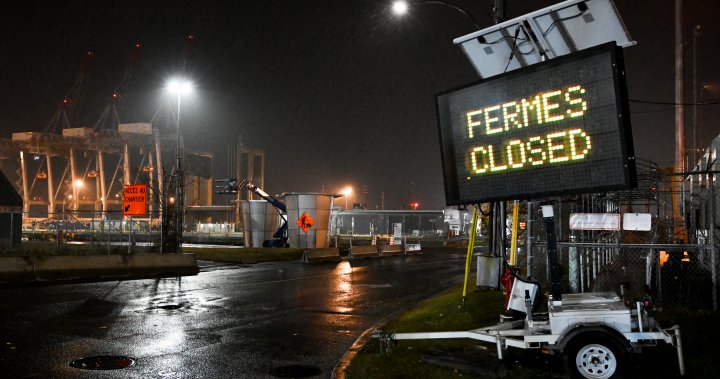Locked-out workers at ports in British Columbia were joined by their peers in Montreal, disrupting trade at Canada’s two largest marine trading hubs. This labor dispute at ports in British Columbia has been ongoing for a week, with little progress towards resolution. The parties broke off talks on Saturday, further exacerbating the situation. Dock workers in Montreal also voted to reject their employers’ latest offer, resulting in another lockout. These disruptions are significant as they affect over half of all goods coming into Canada by sea. The Port of Vancouver, which facilitates the import of goods from Asia, handles about $800 million in freight per day, with the Montreal terminals handling roughly half that amount.
The simultaneous disruptions at the ports are causing concerns among experts and industry professionals. The disruptions come after previous interruptions in Canada’s supply chain, such as the halted operations at the main railways in August and disruptions at B.C. ports and the St. Lawrence Seaway last year. These disruptions, coupled with concerns about global trade patterns following Donald Trump’s election victory in the United States, are raising red flags for Canadian businesses. There are worries that if labor disputes continue to result in shutdowns, foreign firms may be hesitant to invest in Canada, impacting the country’s economic growth.
Experts are warning that the ongoing labor disputes at the ports could have significant implications for Canada’s economy. While larger retailers have taken precautions by stocking up on inventory earlier in anticipation of disruptions, smaller and medium-sized businesses may be more severely affected. These businesses may experience higher costs, delays, and shortages due to their limited flexibility and alternatives in shipping products. The Retail Council of Canada has also cautioned about the impact of a potential Canada Post strike, creating a triple threat of disruptions for consumers and businesses in the weeks ahead.
As the busy holiday shopping season approaches, minimal impact on consumers is expected due to businesses preparing for potential disruptions. Larger retailers have already ordered stock to ensure shelves are stocked for the holidays, and any additional inventory needs may be routed through U.S. ports. However, smaller businesses without extensive supply chains may face challenges from delays and shortages. If the labor disputes are resolved in a timely manner, it may not have a significant impact on Canada’s economy. However, with uncertainties surrounding economic growth and consumer spending, the ongoing disruptions are adding to concerns about the strength of the country’s recovery in the near term.
The Canadian Chamber of Commerce highlights the importance of resolving the labor disputes quickly to prevent further damage to Canada’s reputation as a business-friendly environment. The disruptions at the ports, along with previous disruptions in the supply chain, send a negative message to potential investors. Foreign firms may be less inclined to set up operations in Canada if labor disputes continue to escalate to the point of shutdowns. The federal government is monitoring the situation closely, emphasizing the urgency for the parties involved to reach an agreement. However, the concerns about ongoing disruptions in the supply chain and global trade patterns are adding to uncertainties about Canada’s economic outlook in the coming years.
Overall, the labor disputes at the ports in British Columbia and Montreal highlight the vulnerabilities in Canada’s supply chain and the potential impact on the country’s economy. With disruptions affecting over half of all goods coming into Canada by sea, there are concerns about delays, shortages, and increased costs for businesses. The ongoing disruptions, coupled with uncertainties surrounding economic growth and global trade patterns, are creating challenges for Canadian businesses. Addressing labor disputes and resolving these issues quickly is essential to prevent further damage to Canada’s economy and its reputation as a stable and business-friendly environment for investors.


